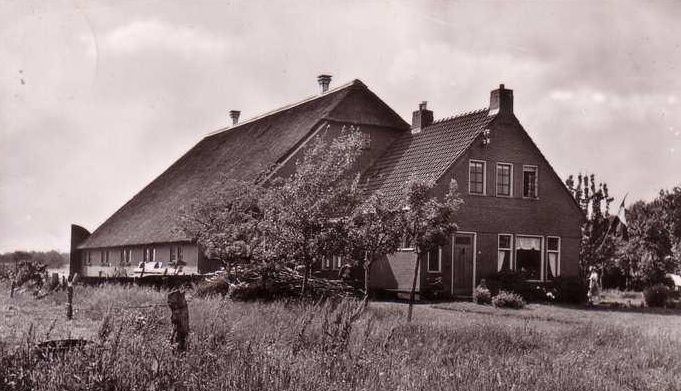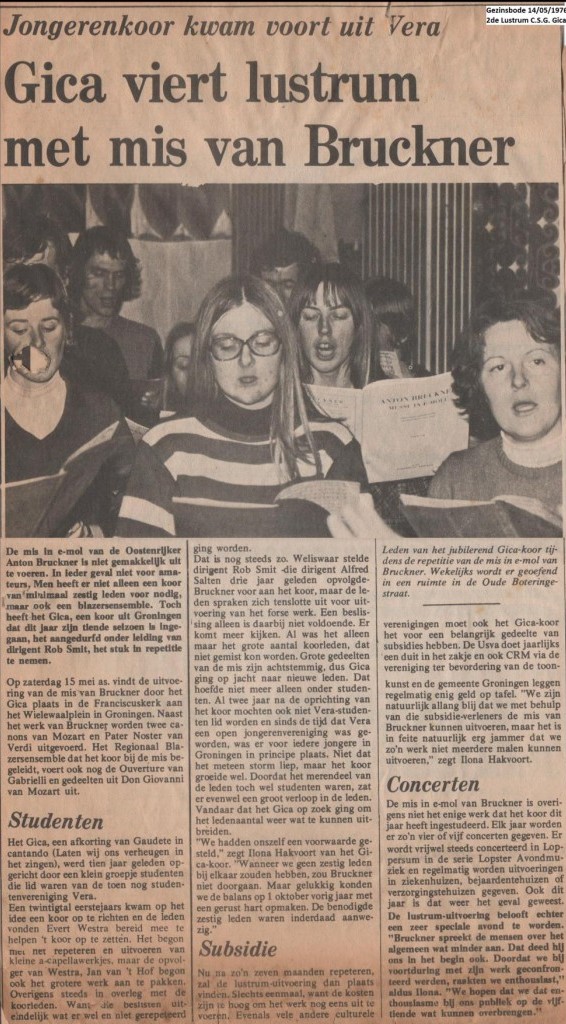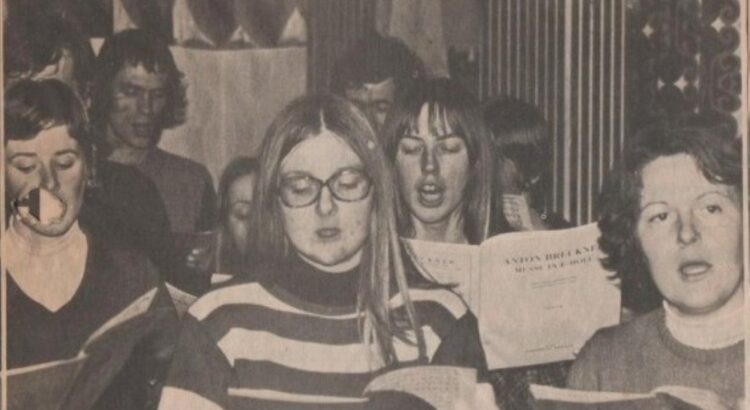The C.S.G. Gica society originated as a sub-society of Vera, the Groningen branch of the reformed students’ union S.S.R. (Societas Studiosorum Reformatorum). Vera is now a music venue on Oosterstraat in Groningen. In those days, however, Vera was only accessible to students. In contrast to other societies, namely Albertus Magnus and Vindicat, Vera liked to occupy itself with the “higher things in life”. But just like the other two, students wishing to gain admission to the society had to complete initiation first. That’s where Gica started: prior to their admission, part of the initiation for new first year students (freshers) was singing a song, one by one, at the piano. The women wore a green cap and the men had to shave all their hair off.
In 1965, Ruurd Veldhuis took the initiative to form Gica. Having been the President of Vera the year before, Veldhuis was on the initiation committee. After the fresh intake of students had sung at the piano, he found 30 who were good enough to come and sing in the green choir. By selecting these members, he inadvertently founded the Gica we know today, dating its actual establishment on 6 October 1965. A year earlier, on 29 October 1964, an orchestra had also been founded at Vera as a sub-society: G.S.O. Mira.
The Van ‘t Hoff era
Initially, Ruurd Veldhuis conducted the first-year members himself. But the students were so enthusiastic, even older ones wanted to sing along. Evert Westra conducted a few times, but he found the ensemble to be insecure and, during the Christmas holidays, he realised he saw no benefit and resigned. Jan van ‘t Hoff then picked up the baton. Van ‘t Hoff was former Director of the music school and conservatoire. After retiring, he wanted to be in front of a small, friendly choir. His contacts in the music world were very useful to the choir when it came to assembling an orchestra. Van ‘t Hoff also always took care of the musical programme – no one else touched it. Perhaps his most extraordinary trait was that he talked a lot, often about Goethe’s Theory of Colours.
Rehearsal weekends
The first rehearsal weekend was held on 11 and 12 February, 1967, in “De Breeder Wiedten” conference centre in Warffum. It must have been freezing cold. A few months later, another rehearsal weekend was held at a new location, the Bastiaans family farm “Zonnehoeve” in Roden. Rehearsal weekends continued here for a long time afterwards.

Traditions
Gica soon developed “age-old” traditions, including how prospective members joined the choir:
- Committee appointed for incoming and outgoing members.
- First years leave, meeting adjourned.
- Meeting reopened
- Lights switched off and candles lit in Kemenade (part of the VERA society).
- Meeting notified by the singing of Io vivat.
- People enter to the chant of Io vivat, they line up, new members announced by the committee.
- Meeting reopened by the President
There was also the tradition of knighting aspiring C.S.G. Gica members with a scimitar, before they then put on sashes. Despite its many traditions, Vera wanted to remain a welcoming society, which was evident from the number of students joining who were not from an academic background, or who were not at least at grammar school level. This was something that contrasted with the other societies.
The first Gica song
At the beginning of the 1968 academic year, there was a discussion about whether or not to allow former members to be Gica members once again. Just as exclusive traditions were discussed at Gica, initiation was being discussed at Vera. Initiation was abolished that same year. The dress code was also relaxed.
In that same year, members also searched for a patron for the choir, which, according to the editors, was never found. However, a Gica song was written, with text by Klaas Hoekstra and music by Frans Lambour. The language, of course, was student-y dog Latin. The song was performed once again during the 1991 lustrum celebration.
Gica becomes independent
Gica split away from Vera during the 1969–1970 academic year. That same year, Van ‘t Hoff – as the choir members continued to respectfully call him – announced that he wanted to leave on account of his advancing years. On the advice of two choir members Siep and Pim, the board contacted Alfred Salten, conductor of the Frysk orchestra. Van ‘t Hoff did not approve of him: he thought that where Gica was concerned, some things had to be left up to the Gods. Alfred Salten, however, was a perfectionist and very keen on discipline. However, when Salten came to attend rehearsals, Van ‘t Hoff helped Gica by only performing the songs that the Gicans already knew very well. Salten stayed with Gica and was the first to give a standing ovation after Van ‘t Hoff’s final concert with them. Since 1969, singers from outside Vera are also permitted to become Gica members, and the choir is eligible for a subsidy from the USVA (Students’ Culture Centre in Groningen).
Recently, Gica membership has fluctuated between 30 and 60, and the five people who sit on the choir’s board are elected annually from among its members. Following in the footsteps of, among others, Geert-Jan van Beijeren Bergen en Henegouwen and Dick Dijk, the conductor David van Roijen is currently in charge of the choir’s musical direction.

